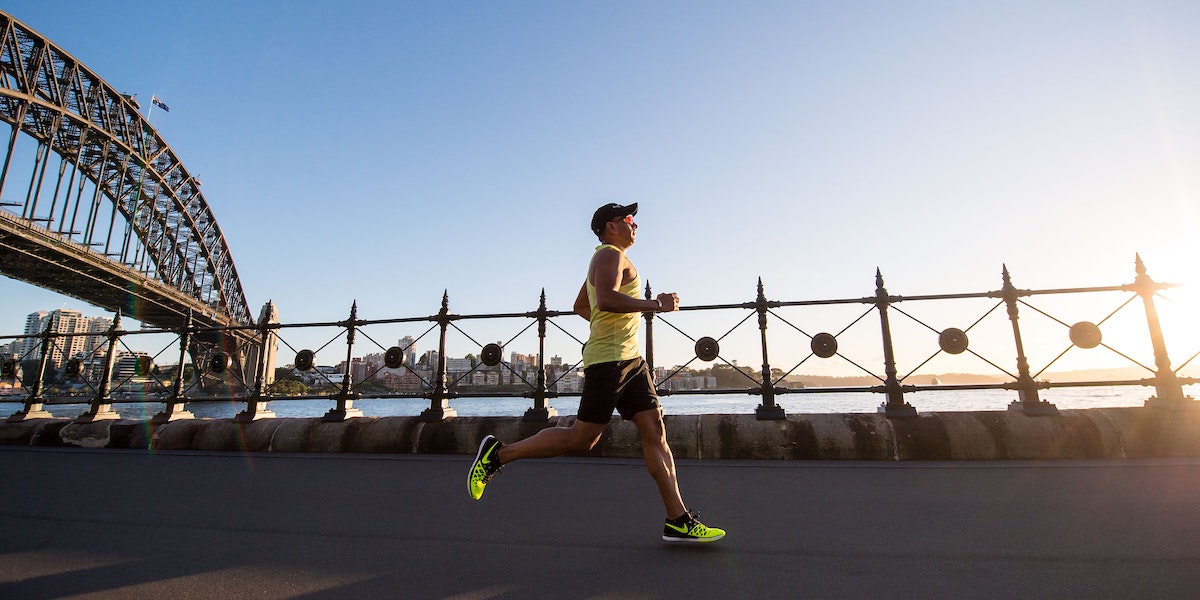Steve Magness is a performance coach and lecturer who trains nearly 20 professional runners, including Olympians. As a high school runner, he ran a mile in 4:01, which at the time ranked him as the #1 high school runner in the country, #6 all time, and #3 in the world. He recently sat down with Heleo’s Editorial Director, Panio Gianopoulos, to discuss why achieving athletic and creative success actually means working less hard, and other critical insights from his latest book, Peak Performance: Elevate Your Game, Avoid Burnout, and Thrive with the New Science of Success.
This conversation has been edited and condensed. To view the full version, click the video below.
Panio: How did this book come about?
Steve: It actually came out of my own frustrations. I was a really good high school runner, the fastest high school runner in the nation in 2003. [I was] 6th fastest of all time for American high schoolers, and number 3 or 4 in the world. At that point I thought, “My future is the Olympics.” Then I went off to college and trained hard and competed well, but saw my performance go backwards. And eventually, I ran myself into the ground, and I never ran faster than I did in high school.
So now I coach elite runners, and my thought process has always been, “To be the best, you have to put in a lot of work. But is there a way to do it where it’s sustainable, where you don’t burn out, where you can last?” That’s what brought about this book.
Panio: What was the issue? Were you training too hard?
Steve: I was obsessed with running. It was all that mattered. I would run 120 miles per week when I was 18 or 19 years old, and what I needed was someone to hold the reins back. I think I would have run much better, because I drove myself into physical fatigue. My body was wrecked, immune system trashed. And that transmitted into this mental burnout, where that desire to run kind of went away. So it was just working too hard, and not giving myself the chance to recover.
Panio: The importance of rest is very counter-intuitive. [But] there is a balance between how hardcore you go and how much you rest.
Steve: That’s one of the things we really want to get across. The message out there is: work really hard, put your nose to the stone, and grind away. But regardless of whether it’s athletics or life, the same principle applies: we call it “Stress + rest = growth.” To get growth and adaptation, whether physical or mental, you have to have rest. Your body adapts when it has time to come off the stresses and stimuli. For instance, we process learning when we sleep.
Trending: 5 Reasons Life Gets Better After Your 40s
So if I’m working really hard writing a book and I have a deadline, the temptation is to stay up until 2 a.m. to get it done. But the work suffers. Say I don’t have the conclusion on this paragraph or chapter. If I step away at 11 o’clock and go to sleep, I wake up refreshed and, more often than not, it’s just there. I’m like, “Oh this makes sense. There it is.”
Panio: That flies in the face of this myth of the lone genius typing away until five in the morning. It’s just not sustainable.
“To get growth and adaptation, whether physical or mental, you have to have rest.”
Steve: It’s not sustainable, and it doesn’t work very well. And actually, research shows that if you work diligently on something, and then step away and do something mildly distracting like doing your dishes or taking a shower, that’s where a-ha moments come in. Stress the brain, then back off and distract it with something else, and let your subconscious process what you were working on. Then you’ll get this nice a-ha moment.
Panio: Inspiration is like a cat. You have to ignore it, then it will wander over and you’re like, “Oh, there you are.”
It’s interesting that this works for both physical and psychological things. Because I would imagine, wrongly, that the body and the mind are different, that they have different kinds of resilience.
Steve: The reality is there is a deep connection between mind and body. If you change your mindset on something, it will change the hormonal response to it. I could come into this interview and get all nervous and say, “Oh my gosh, I don’t know if I can do this.” But if I see it as, “Okay, that’s going to be a challenge and a good thing, it’s going to make me better,” then the hormonal response in terms of cortisol will completely differ.
Panio: But how long can you handle a stressful situation before you just deteriorate?
Steve: That’s where that equation comes in. The harder and longer the stress is, the other part of the equation has to counterbalance it. We have to be able to step back and step away. Taking prolonged vacations, or frequent weekends where you step away from work, benefits your work in the long term.
A top consultancy group [had been] working 80, 90 hours a week. They [then] gave [their employees] one night off a week. Everyone was like, “Oh, I can’t do that. I’m going to fall behind.” But they forced them to do it, and their ratings went up after just one night off. It provides that moment to breathe, recover, and regain strength and willpower so you can go at it harder next time.
Panio: Right. If you’re relying on cognitive and imaginative abilities, how long can you do that for?
Steve: Exactly. If I go out for a run, I’m going to get fatigued, and there’s going to be a point where I can’t run anymore. The same thing happens in the mind. The brain runs on glucose, the same thing muscles do. That glucose will decrease when you are cognitively going after something for a while, and your performance will suffer until you step back and, just like you do with your body, let your mind recover.

Panio: Were you surprised by any of the findings in the research?
Trending: 5 Simple Strategies for Persuading Anybody
Steve: I think what surprised me the most was how much we can influence that mind-body connection. There was some really fascinating research by one of the head researchers and coaches for the U.S. Olympic field hockey team. He had this idea that he could manipulate testosterone levels, which are tied to performance in athletics, by psychologically priming his players.
He tried videos and inspirational speeches, and then different things like having them do things that they liked to do before a match, versus a traditional approach of, “We are going to warm up and do this and get fired up.” I asked him what works best and he said, “Give people the opportunity to do something they enjoy and their testosterone levels go up.” So in the athletic realm, if it’s someone who loves going out for an easy jog, their testosterone levels will go up when they do an easy jog. But if they do something short and fast like sprints, and they don’t enjoy it, levels drop. You have to go after something you enjoy and the hormones will follow.
Panio: That is surprising because a lot of ideas are to just grit your teeth and do the thing you hate. But in fact, enjoyment is a key component.
Steve: It’s key because if you have this dread, then you see it as a threat. And that puts your body in almost like a fight-or-flight mode, on the flight side, where you’re scared to do it, you have fear of failure, and the hormones follow that. So gritting your teeth, while it’s glamorized, is probably one of the worst things that you can do.
Panio: I had a conversation with Angela Duckworth, who wrote a great book on grit, and one of her big points is that as a parent, you think “I’m going to force my kid to play piano every day” but in fact, if the kid doesn’t like what they are doing, you are wasting your time. You have to have some passion for it.
Steve: Right. They have to have a why. It’s not something you can throw upon someone. You see that in coaching all the time with athletes. Parents say, “I’m going to make my child the next NFL superstar and get them a college scholarship.” If the motivation is coming from the parent and not intrinsically from the kid, they might see a little success because they are so scared of the parent. But in the long term they’ll burn out.
Panio: You talk about the importance of purpose and overriding ego. But it seems like so much achievement is driven precisely by ego. If you override it, don’t you get all Zen and not care, and stop running?
Steve: That’s a big misconception. When you have an overriding purpose, it actually boosts performance. If you watch any sporting events like the Superbowl, the NBA finals, or the New York City Marathon, they ask the winner, “What happened, what motivated you?” No one says, “I want to thank myself and all the stuff I did to get here.” Instead they say, “I want to thank my family, and everyone who sacrificed for me,” or, “I want to give this up to God.” If you have that as the motivating source behind you, your brain says, “Oh, this is really important. We’re not going to hold the reins back, we’re not going to make this person feel fatigued until later because this matters a whole heck of a lot.”
Panio: I always thought they were just saying that because you’re supposed to.
Steve: I’m sure some people do that. But if you dig down into the really special moments, for instance when marathoner Meb Keflezighi won the Boston Marathon the year after the bomb, he had the names of the bomb victims on his bib. He was up there in age. He should not have won that race at all, no possible way. But he had this extra motivation being an immigrant and an American citizen now. It meant a lot to him. I think in those circumstances, it is a very potent performance enhancer.
“Gritting your teeth, while it’s glamorized, is probably one of the worst things that you can do.”
Panio: As a running coach, what do you find is the most common mistake people are making?
Trending: 40 Nonfiction Books to Look Out for in 2024
Steve: Too fast too soon. Especially for beginners or recreational runners, you sign up for your local 5K. Then you say, “This is a blast, but the 5K isn’t gonna get me Facebook and Instagram likes, so I need to go do the marathon.”
It’s great that they have those big goals, but they go from zero to 100 trying to get there. That’s why you see a lot of these injuries and stress fractures and shin splints, because they don’t give their body that space to adapt to the increased training. When they are getting started, people need to take a step back and take the time for their body to get ready.
Panio: So if I were to start running I should just run twice a week, three times a week?
Steve: My favorite saying is, “Don’t go there until you need to go there.” So start with twice a week. Once that starts to feel comfortable, then you say, “Okay, I need to make myself a little bit uncomfortable so I keep adapting. Not so much that I don’t want to do this or get hurt, but just a little bit.” In the book we call that Just Manageable Challenge. It’s a nice gradual incline.
Panio: And does that approach apply to creative pursuits? Say somebody starts learning to play the piano. Should they go practice for two hours a day, or just 20 minutes and keep it steady?
Steve: It applies to pretty much everything, because the mind and body adapt in the same way. The learning occurs in the same way. You apply the stimulus, whether that’s physical in running or mental in learning the piano, and then you give yourself time to adapt. If you go too intense too soon, you’ll adapt a little bit. But now to get better, you have to increase that load, and you’re not going to go from playing the piano for four hours a day to six hours. There’s a limit.
Panio: A lot of these examples were around events like marathons or creating something. What about if you just work in an office from 9 to 5. How does Peak Performance apply to a regular, everyday routine?
Steve: One example is instead of taking just one break for lunch, work for 30 minutes really hard, and then step away for two to three minutes. Just repeat that pattern, and your performance goes up. Your enjoyment of it goes up too.
It’s like doing intervals on the track. You have this stress, and then you step away. It rejuvenates you, and then you can come back at it, instead of doing the grind so that by 3 o’clock, we’re sitting on Facebook and looking at cat videos. It’s preventing ourselves from going into that trap.



























